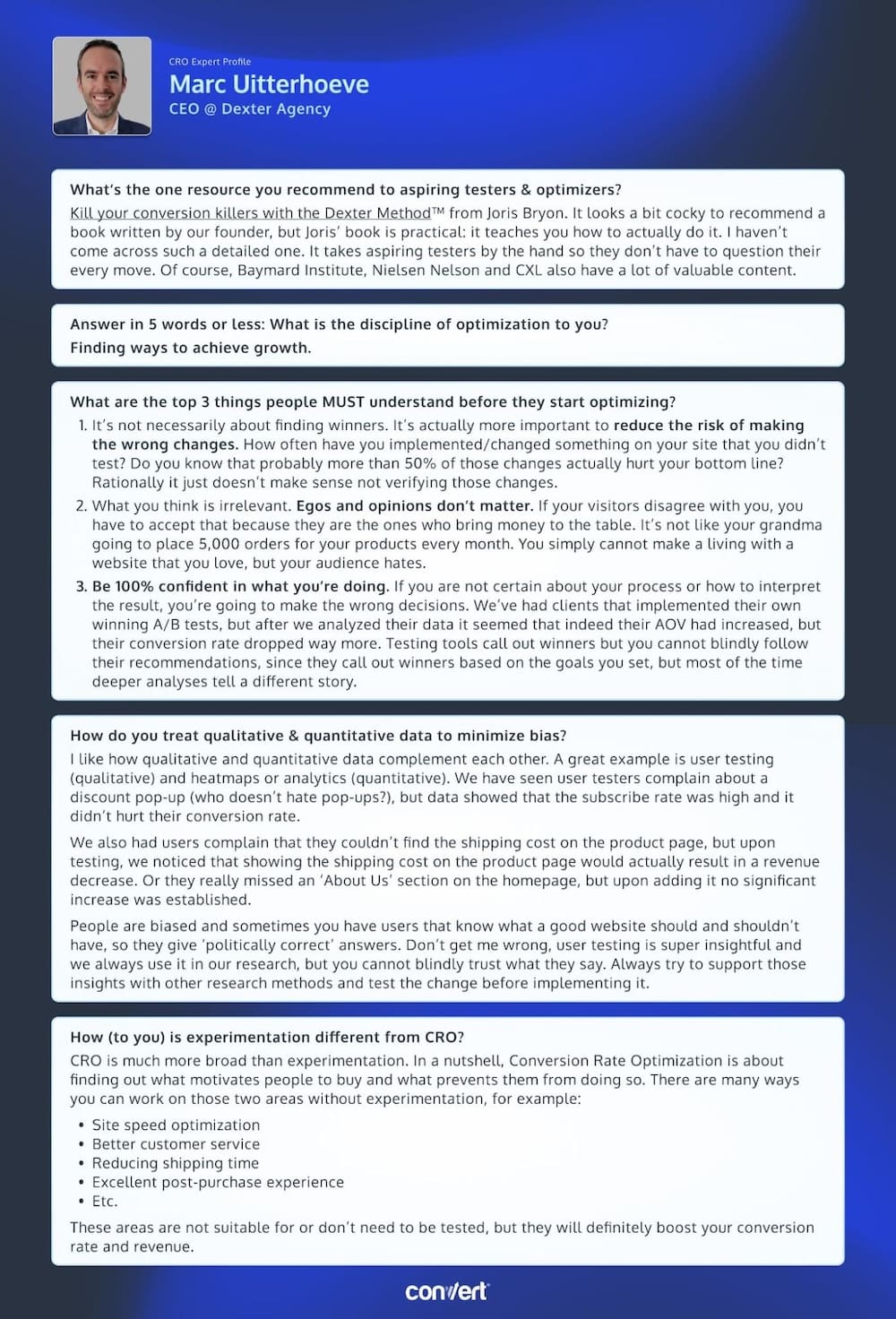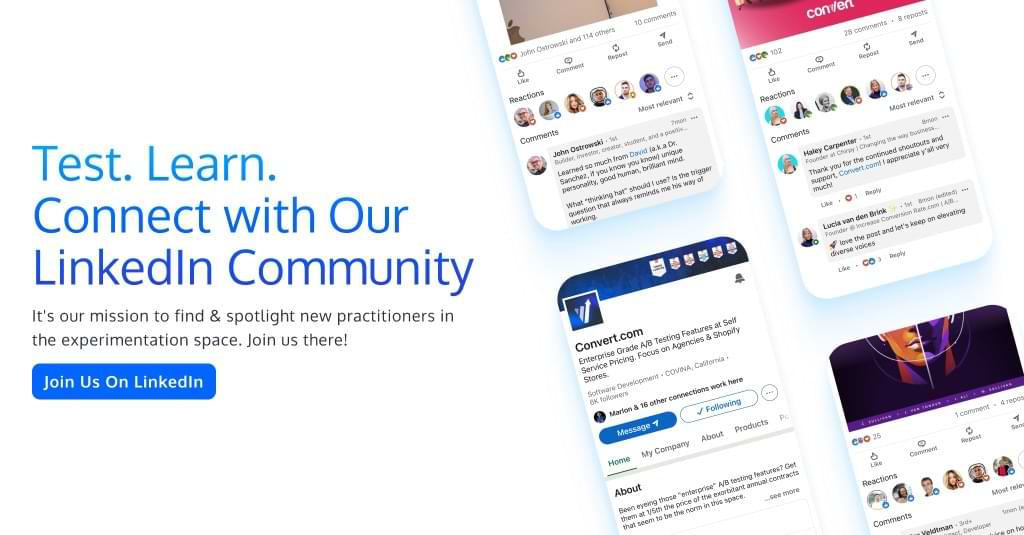Testing Mind Map Series: How to Think Like a CRO Pro (Part 57)
Interview with Marc Uitterhoeve
Every couple of weeks, we get up close and personal with some of the brightest minds in the CRO and experimentation community.
We’re on a mission to discover what lies behind their success. Get real answers to your toughest questions. Share hidden gems and unique insights you won’t find in the books. Condense years of real-world experience into actionable tactics and strategies.
This week, we’re chatting with Marc Uitterhoeve, Chief Executive Officer of Dexter Agency, a Convert-certified agency, helping ecom stores maximize their online revenue potential through data-driven optimization.
Marc, tell us about yourself. What inspired you to get into testing & optimization?
I started out in online marketing, doing too many different things like website management, email, Google Ads, etc. and I felt I wasn’t excellent in either of those things.
On the search for something more specialized, and something that I could be trained in by a pro, I found a job ad for Dexter Agency to do CRO. I didn’t even know what it was. Mind you, it was 2017 – almost no one knew what CRO was. However, the description appealed to me (and the company’s headquarters as well – it is located in Malta) and I applied.
I got excited right away – what I loved was the combination of creativity and being data-driven. Besides that, in CRO you are basically looking for ways to optimize something, to make a website more efficient. I am like that in my personal life as well so this comes naturally to me, though experimentation is challenging – there are no 2 Marc Uitterhoeves that I can A/B test 😉
However, businesses CAN – and in my opinion SHOULD – be testing. The fact that you can verify your hypotheses with A/B tests removes the risk of making changes that actually hurt the business and sometimes throw businesses back by a whole year or more. It just really makes me excited to see it paying off and help websites grow in this data-driven way.
How many years have you been testing for?
7 years now. Being CEO made it quite impossible to test regularly, though I still run a couple of A/B tests every so often.
What’s the one resource you recommend to aspiring testers & optimizers?
Kill your conversion killers with the Dexter Method™ from Joris Bryon. It looks a bit cocky to recommend a book written by our founder, but Joris’ book is practical: it teaches you how to actually do it. I haven’t come across such a detailed one. It takes aspiring testers by the hand so they don’t have to question their every move. Of course, Baymard Institute, Nielsen Nelson and CXL also have a lot of valuable content.
Answer in 5 words or less: What is the discipline of optimization to you?
Finding ways to achieve growth.
What are the top 3 things people MUST understand before they start optimizing?
- It’s not necessarily about finding winners. It’s actually more important to reduce the risk of making the wrong changes. How often have you implemented/changed something on your site that you didn’t test? Do you know that probably more than 50% of those changes actually hurt your bottom line? Rationally it just doesn’t make sense not verifying those changes.
- What you think is irrelevant. Egos and opinions don’t matter. If your visitors disagree with you, you have to accept that because they are the ones who bring money to the table. It’s not like your grandma going to place 5,000 orders for your products every month. You simply cannot make a living with a website that you love, but your audience hates.
- Be 100% confident in what you’re doing. If you are not certain about your process or how to interpret the result, you’re going to make the wrong decisions. We’ve had clients that implemented their own winning A/B tests, but after we analyzed their data it seemed that indeed their AOV had increased, but their conversion rate dropped way more. Testing tools call out winners but you cannot blindly follow their recommendations, since they call out winners based on the goals you set, but most of the time deeper analyses tell a different story.
How do you treat qualitative & quantitative data to minimize bias?
I like how qualitative and quantitative data complement each other. A great example is user testing (qualitative) and heatmaps or analytics (quantitative). We have seen user testers complain about a discount pop-up (who doesn’t hate pop-ups?), but data showed that the subscribe rate was high and it didn’t hurt their conversion rate.
We also had users complain that they couldn’t find the shipping cost on the product page, but upon testing, we noticed that showing the shipping cost on the product page would actually result in a revenue decrease. Or they really missed an ‘About Us’ section on the homepage, but upon adding it no significant increase was established.
People are biased and sometimes you have users that know what a good website should and shouldn’t have, so they give ‘politically correct’ answers. Don’t get me wrong, user testing is super insightful and we always use it in our research, but you cannot blindly trust what they say. Always try to support those insights with other research methods and test the change before implementing it.
How (to you) is experimentation different from CRO?
CRO is much more broad than experimentation. In a nutshell, Conversion Rate Optimization is about finding out what motivates people to buy and what prevents them from doing so. There are many ways you can work on those two areas without experimentation, for example:
- Site speed optimization
- Better customer service
- Reducing shipping time
- Excellent post-purchase experience, etc.
These areas are not suitable for or don’t need to be tested, but they will definitely boost your conversion rate and revenue.
Talk to us about some of the unique experiments you’ve run over the years.
We once had a huge checkout change for a client of ours. It was unique in the sense that there aren’t many radical checkout tests in CRO. More often than not, it’s about incremental changes that grow your store. But this client was afraid we were optimizing something that just needed an entirely different structure. We warned him about such a radical change because it would be quite expensive to develop with no guarantee for an uplift. We also didn’t stop him from doing it, because we don’t claim to always be right – if we would be, we’d have a win rate of 100%.
He was fully aware of the risks and went ahead. After a few months of design, development and QA, it went live and unfortunately, it ended up being a loser. He knew the risks and he took it like a champ, but it still hurt. We all loved the new checkout, but the visitors didn’t and that is what counts.
We’ve also run tests in which we increased the product prices, which was a headache in itself. You need to be sure everything is coherent and that people don’t see a different price in the Google search results. Oftentimes, it’s just better to do it with sequential testing to minimize any risk of invalidating your data, even when sequential testing has its own risks.

Our thanks go out to Marc for taking part in this interview! To our lovely readers, we hope you found the insights useful and encourage you to apply them in your own optimization efforts.
Don’t forget to check back twice a month for more enlightening interviews! And if you haven’t already, check out our past interviews with CRO pros Gursimran Gujral, Haley Carpenter, Rishi Rawat, Sina Fak, Eden Bidani, Jakub Linowski, Shiva Manjunath, Deborah O’Malley, Andra Baragan, Rich Page, Ruben de Boer, Abi Hough, Alex Birkett, John Ostrowski, Ryan Levander, Ryan Thomas, Bhavik Patel, Siobhan Solberg, Tim Mehta, Rommil Santiago, Steph Le Prevost, Nils Koppelmann, Danielle Schwolow, Kevin Szpak, Marianne Stjernvall, Christoph Böcker, Max Bradley, Samuel Hess, Riccardo Vandra, Lukas Petrauskas, Gabriela Florea, Sean Clanchy, Ryan Webb, Tracy Laranjo, Lucia van den Brink, LeAnn Reyes, Lucrezia Platé, Daniel Jones, May Chin, Kyle Hearnshaw, Gerda Vogt-Thomas, Melanie Kyrklund, Sahil Patel, Lucas Vos, David Sanchez del Real, Oliver Kenyon, David Stepien, Maria Luiza de Lange, Callum Dreniw, Shirley Lee, Rúben Marinheiro, Lorik Mullaademi, Sergio Simarro Villalba, Georgiana Hunter-Cozens, Asmir Muminovic, and our latest with Edd Saunders.
Written By
Marc Uitterhoeve
Edited By
Carmen Apostu


